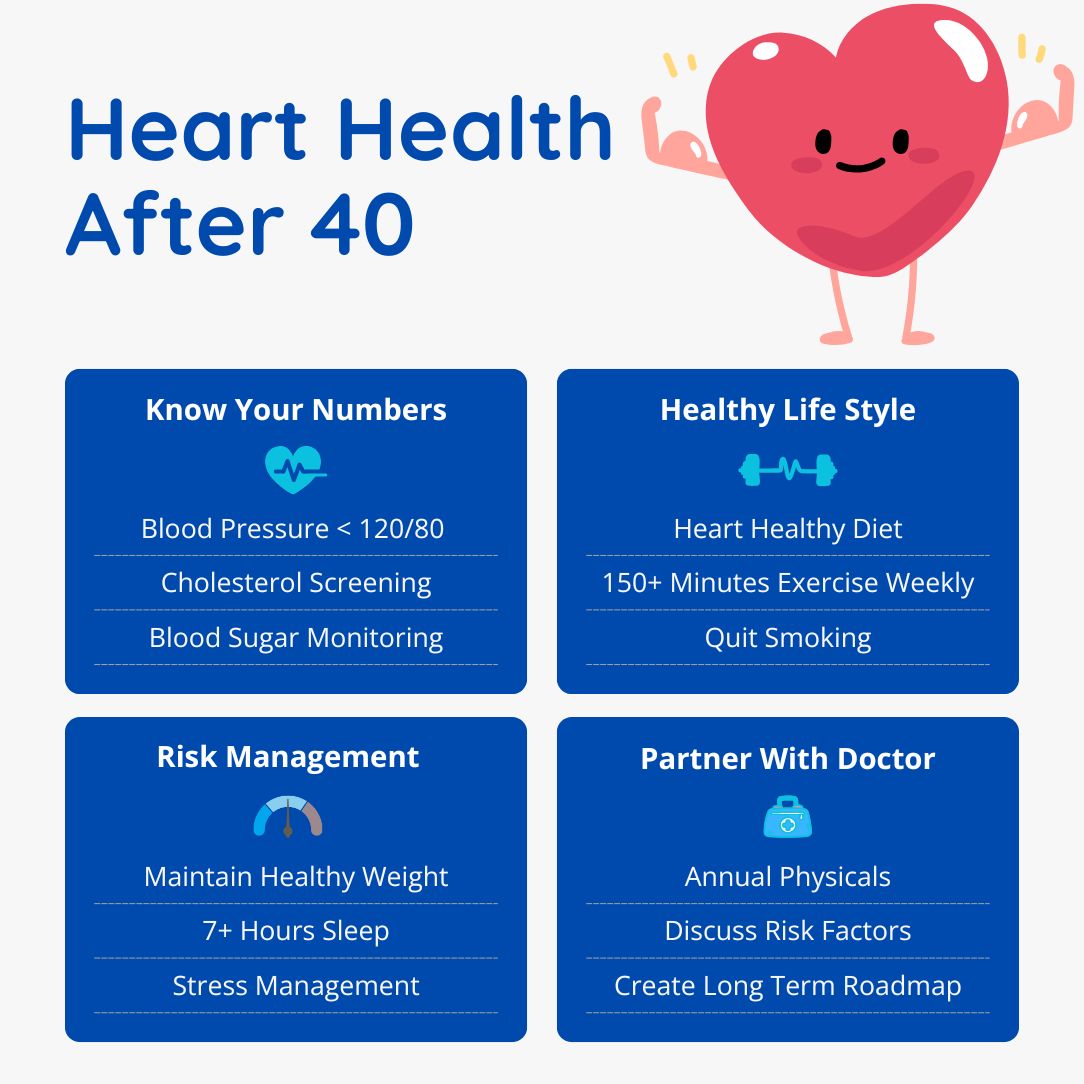Key Takeaways
- Your 40s are a critical time to focus on heart health, as risk factors established in this decade are highly predictive of long-term cardiovascular wellness.
- Lifestyle choices are your most powerful tool for prevention. A heart-healthy diet, regular physical activity (at least 150 minutes per week), and quitting smoking can dramatically reduce your risk of heart disease.
- Regular check-ups with your primary care provider are essential for monitoring key health metrics like blood pressure, cholesterol, and blood sugar, and for creating a personalized prevention plan.
As you enter your 40s, life can feel busier than ever with career demands, family responsibilities, and personal goals. It's easy to put your own health on the back burner. However, this decade marks a crucial turning point for your long-term cardiovascular health. The choices you make and the habits you form in your 40s have a profound impact on your well-being for decades to come.
At SOM Medical Practice, we believe in empowering our patients with the knowledge to take control of their health. This guide provides a comprehensive overview of what you need to know about heart health after 40, from understanding your risk factors to adopting a heart-healthy lifestyle.
1. Why Your 40s Are a Wake-Up Call for Heart Health
Research has shown that the presence of cardiovascular risk factors in your early 40s is "highly predictive" of your health status at ages 65, 75, and 85 [1]. A long-term study published in the journal Circulation found that individuals with no major risk factors in their 40s lived longer, had more years free of chronic illness, and incurred lower healthcare costs later in life. In fact, those with better cardiovascular health saved an average of $18,000 during their Medicare years [1].
This is also the decade when certain health issues become more prevalent. For example, Type 2 diabetes, a significant risk factor for heart disease, most often develops in people over 45 [1]. For women, while menopause itself doesn't cause cardiovascular disease, risk factors can increase around this time, and heart disease symptoms may become more evident.
2. Know Your Numbers: The Foundation of Heart Health
One of the most important steps you can take for your heart health is to know and understand your key health metrics. Regular screenings with your primary care provider are essential for monitoring these numbers.
| Health Metric | Healthy Target | Screening Frequency (for average-risk adults) |
| Blood Pressure | Less than 120/80 mmHg | At least once every 1-2 years |
| Cholesterol (Lipid Panel) | Varies based on individual risk | Every 4-6 years |
| Blood Sugar (Glucose) | Varies; checked for diabetes risk | Every 3 years, starting at age 45 |
| Body Mass Index (BMI) | 18.5 - 24.9 | At each physical exam |
Source: American Heart Association, Mayo Clinic [1, 2]
Your doctor at SOM Medical Practice can help you understand what these numbers mean for you and create a personalized plan to keep them in a healthy range.

3. The Pillars of a Heart-Healthy Lifestyle
While you can't change your age or family history, you have significant control over your lifestyle, which is the most powerful tool for preventing heart disease. The American Heart Association's "Life's Simple 7" highlights the key areas to focus on [1].
- Eat a Heart-Healthy Diet: Adopt a diet rich in fruits, vegetables, whole grains, and lean proteins like fish and beans. The Mediterranean diet and the DASH (Dietary Approaches to Stop Hypertension) eating plan are excellent models. It's equally important to limit your intake of salt, sugar, highly processed foods, and unhealthy fats [2].
- Get Moving: Aim for at least 150 minutes of moderate-intensity aerobic exercise, such as brisk walking, each week. You can break this down into 30 minutes a day, five days a week. Incorporating strength training twice a week is also beneficial. Even small changes, like taking the stairs or gardening, contribute to your overall activity level [2].
- Quit Smoking: If you smoke, quitting is the single best thing you can do for your heart. The benefits are almost immediate. Your risk of heart disease drops by about half just one year after quitting [2].
- Maintain a Healthy Weight: Being overweight, especially around your midsection, increases your risk of heart disease. Even a modest weight loss of 3-5% can significantly improve your triglyceride and blood sugar levels [2].
- Get Quality Sleep: Most adults need at least seven hours of sleep per night. Chronic lack of sleep is linked to a higher risk of high blood pressure, obesity, and heart attack [2].
4. The Role of Stress Management
Chronic stress can contribute to high blood pressure and other heart disease risk factors. Many people also cope with stress in unhealthy ways, such as overeating, smoking, or drinking alcohol. Finding healthy ways to manage stress is crucial for your heart.
Consider incorporating these practices into your routine:
- Regular physical activity
- Relaxation exercises or meditation
- Mindfulness and yoga
If you're struggling with stress, anxiety, or depression, it's important to talk to your doctor. These conditions are linked to heart disease, and treatment can make a significant difference.
5. Partnering with Your Doctor for a Healthier Future
Your annual physical exam is more than just a check-up; it's an opportunity to partner with your primary care provider to create a roadmap for your long-term health. Use this time to discuss your lifestyle, family history, and any concerns you may have.
At SOM Medical Practice, our team is dedicated to providing comprehensive, personalized care to help you stay healthy and active through your 40s and beyond. We offer a full range of preventive services, including health screenings, lifestyle counseling, and chronic disease management, at all our Western New York locations.
Don't wait for symptoms to appear. Take proactive steps today to protect your heart for a healthier tomorrow. Schedule your annual physical with a SOM Medical Practice provider and start your journey to better heart health.
References
[1] American Heart Association. (2018). Heart health at any age – 40, 50, 60 and beyond. https://www.heart.org/en/news/2018/07/20/heart-health-at-any-age-40-50-60-and-beyond
[2] Mayo Clinic. (2023). Heart disease prevention: Strategies to keep your heart healthy. https://www.mayoclinic.org/diseases-conditions/heart-disease/in-depth/heart-disease-prevention/art-20046502










